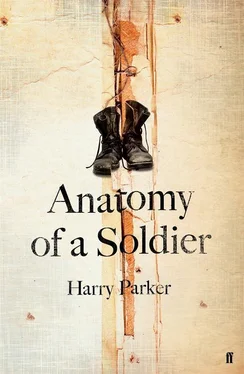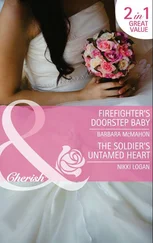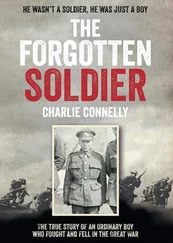A T-piece was firmly rocked onto where I protruded from your mouth and then connected to a mechanical ventilator. I was part of a system now. I was inside you, at the edge of your lungs. Oxygen-rich air pulsed through me and I started breathing for you.
You were covered in dust; a thin coat of it ghosted the skin of your face. Your clothing was pale with dirt except where it was dark with blood or had shredded away. You were bare below the waist and the white skin of your thighs had smears and red fingerprints.
‘Now let’s get him on the table. Full examination ASAP.’
They wheeled the stretcher alongside the empty bed and in unison pulled you across, leaving viscous pools on the stretcher. A bag of plasma was hooked up.
Your left foot was missing and splinters of bone jutted out from your calf. Your right leg was open along the inside with bulging wounds that were glutinous next to your skin. Your right calf was gone. Each arm was punched with holes and bled. Your left little finger hung by a sinew. Your groin had a clean shining wound that oozed blood. A testicle hung open, deformed and alien.
The woman moved around the stretcher until she was over you. ‘Okay, let’s prep him as quick as we can. Kirsty, get his blood checked. How many bags of fluid has he had?’
‘One administered on the ground, ma’am,’ the man with the helmet said, ‘and we’ve given him three since.’
‘Okay, let’s get the cannulas in.’
The woman stood back and assessed. The others worked around you. They cut away your remaining clothes and checked over your naked body. They wiped and cleaned you and taped your eyelids shut. They stuck pads to your chest and the machine above you sounded three times and then once before settling into a rhythm.
‘Tachycardic. Sixty over thirty. Weak,’ one of them said.
‘Blood test done, he’s O positive. Initial bloods show Hb of six.’
‘Right, Kirsty, let’s give him two more bags stat.’
The machine above you started beeping.
‘Blood pressure dropping,’ a nurse said.
And then another machine flashed and rang a clear flat pitch in the room and they were over you and pulling a small trolley towards you.
‘Defibrillator,’ the woman said and reached for the paddles.
I was inside you and I could feel you slipping away as your heart faltered. Gel was squeezed onto the paddles and she rubbed them together and placed them on your chest.
‘Clear,’ she said between each jolt of your body, and I felt your chest convulse around me as electricity bolted through us.
‘For God’s sake,’ one of the nurses said.
But your heart flinched again — and then again — and blood moved through your lungs and the line of spikes came back on the display.
*
They continued to work on you. You still bled too much so they cut a vertical line along your stomach past your navel. They went inside you with metal clamps and stopped blood from ebbing out through your femoral arteries. They removed a tourniquet and threw it in a surgical bin. A nurse inserted a tube up your penis.
When they were convinced you were stable, they wheeled us out of that room and down the corridor. They placed you in a scanner that whirred around us. The doctors and nurses peered at monitors and surveyed the damage. Then they wheeled you on to surgery.
They worked on your left stump, cleaning away the earth and debris that had been blown into you. They bent all their concentration on you and slowly you were brought back from the edge. You were not a whole to them, just a wound to be closed or a level on a screen to monitor or a bag of blood to change.
A surgeon pulled away from you and blinked in the lights and looked around at the team. ‘Okay. He’s more stable. Bleeding now stemmed in both legs,’ she said. ‘We’ll leave the left leg traumatic amputation as is for now. But I’m worried about the exposed femoral in the right thigh. I will work on that with Lisa. Peter, are you happy with his status?’
‘Yes, Gill.’
‘Okay. Can you patch up the lesions on the arms? I also want to do exploratory on that left forearm wound. I think it could’ve caused nerve damage. If you’re happy to make a start with that as well.’ She looked at the next man. ‘Tim, I think we’re going to have to cut that finger away. And then sew it up if you don’t mind. That’s the least of his problems.’
‘Yes, Colonel,’ he said and went to rescrub his hands.
‘Once that’s all done I want to have another look at his groin. I think we’ll probably have to do an orchiectomy and I want to get it right — he’s been extremely lucky in that department.’
*
After a few hours they were less worried. People talked calmly as surgeons stretched their backs. Finally, the woman made notes on a clipboard and two people administered drugs.
I was still in you, still breathing for you. Your chest rose and fell as the mix of gases passed through me and down into you. Your arms and lower body were covered in white plastic bandages and protruding pipes that pulled the discharge from your wounds. Yellow iodine discoloured your skin and black ink showed below dressings where lines had been drawn. A blue sheet covered you.
You were moved to a room with other men who also had tubes, like me, that held their gormless mouths open. None of them were conscious. They were still, apart from the rise and fall of their chests dictated by machines. It was dark in the room, an air-conditioning unit rumbled in the corner and monitors flashed above each body. The bodies were disfigured, too, and did not fill the beds as they should. The green blankets were flat where limbs should have been.
Nurses moved between the beds and prepped them for transit. Once a machine beeped and flashed red and nurses came and then more people and the machine continued to sound a single note. A crash cart was called for. They were frantic, then frustrated and finally desolate. The bed was wheeled out and never came back.
They were pleased with how you were doing. They changed your drug dosage but kept you sedated and moved you to another room, ready for transit. The nurses who looked after you wrote in your logbook and felt strongly about you, even though they had never met you.
A man wearing a combat uniform came in, a green beret folded in his hand. He was shocked by the misshapen bodies in the beds lined against the wall and the stillness of them. He sat by you and said a few words but was self-conscious. He patted your hand before he left. ‘Stay strong, mate,’ he said quietly.
Later, a team of doctors and nurses arrived and stood behind each bed, flicking through clipboards and looking at X-rays. They moved around the room until they stood over you.
‘Stable enough for transit. He should stay sedated.’
‘We must get him back. The lesions on the right leg need plastics soon.’
‘Let’s do another set of bloods before he goes. And increase his sedation for the flight.’
‘Okay, get him on the flight tonight. Air Support Team Bravo, I think. That’ll give them two unconscious and three walking.’
They moved to the next bed. One remained and took readings from the machines above you. She moved a dial on the mechanical ventilator and the mix of gases that passed through me changed. She pressed a vial onto a cannula that hung from your wrist and filled it with blood. It wasn’t yours but a combination from eight different people.
*
That night you were prepped for transit. Nurses and doctors came and talked through your injuries. They told the transit team everything they could, each item adding to your fragility and the risk of getting you home. They set about you with practised efficiency. My end was pulled from the mechanical ventilator and pushed into a portable unit. They stood over you and nurses said, ‘On three: one, two, slide,’ under their breaths as they carefully moved you across to a new bed.
Читать дальше












